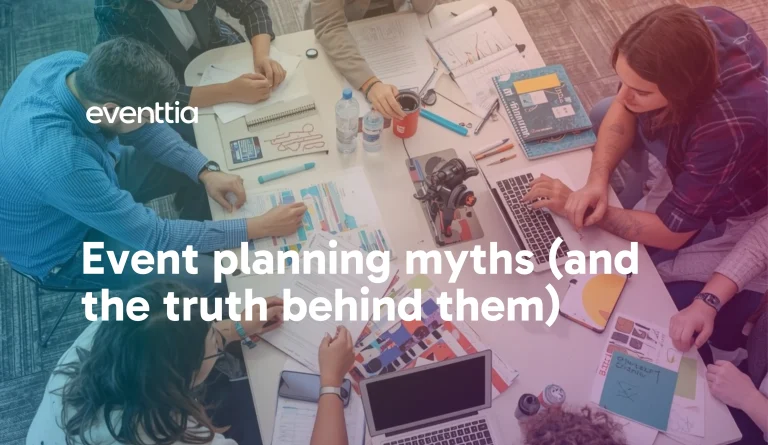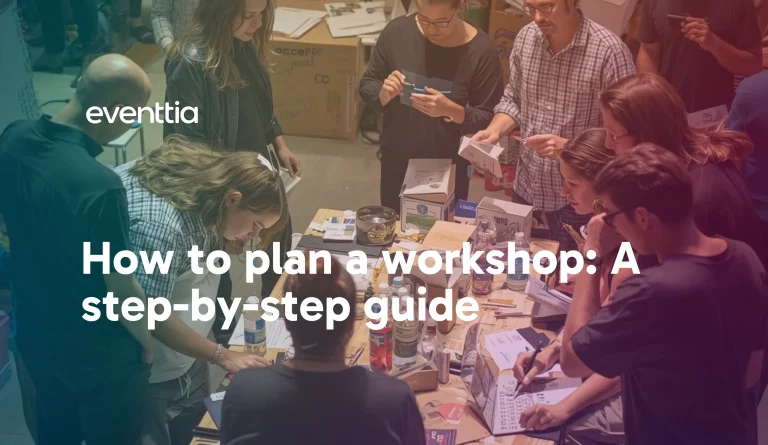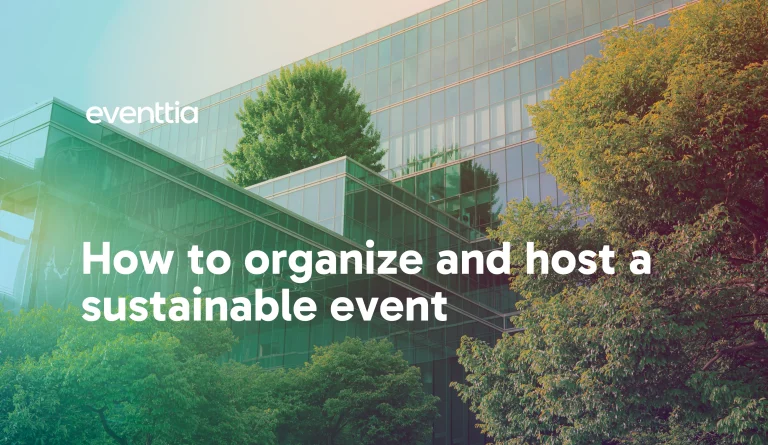Hosting in-store events is an effective strategy for engaging customers, boosting sales, and creating memorable experiences. Whether you are a small boutique or a large retail chain, organizing a successful in-store event requires careful planning and execution.
This article will provide a step-by-step guide to help you plan and host an impactful in-store retail event. From defining your goals and identifying your target audience to selecting the event type and partnering with an event technology platform, we will cover all the essential elements to ensure a great event.
Discover how Eventtia helps world-leading brands digitize and scale their events
Learn more📌 Define your goals
The first step in planning an in-store event is clearly defining your main goal. This goal will serve as the foundation for all subsequent planning decisions. Your goal could be to increase brand awareness, promote a new product, drive sales, build customer loyalty, or any combination of these objectives. Knowing your main goal, you can align your event activities and strategies to achieve the desired outcome.
For example, your main goal is to promote a new product. In that case, your event may focus on product demonstrations, offering exclusive discounts or incentives to attendees, and creating a buzz around the product through social media and promotional materials.
📌 Know your target audience
Understanding your target audience is crucial for designing an in-store event that resonates with them. Conduct market research and analyze customer data to identify your target group’s demographics, interests, preferences, and behaviors. This information will help you tailor the event experience to their needs and interests. Consider age, gender, location, lifestyle, and purchasing habits.
For instance, if your target audience is young professionals interested in fitness, you may organize a wellness event featuring fitness demonstrations, health product samples, and expert talks on maintaining a healthy lifestyle.
📌 Decide the type of in-store retail event
Deciding on the type of in-store retail event is crucial in planning your event. It will determine the format, activities, and overall experience you will provide your attendees. Your goal and the targeted audience will primarily dictate the type of your in-store event.
Are you aiming to increase brand awareness, drive sales, introduce a new product line, or strengthen customer loyalty? Your goals will help you determine the most suitable type of event that aligns with your objectives.
On the other hand, understanding your target audience is essential in selecting the right type of event. Consider people’s preferences, interests, and demographics. This approach will ensure that the event resonates with your target audience and attracts their participation.
Next, evaluate your brand identity. Your brand identity should guide the type of event you choose. Align the event with your brand’s values, image, and positioning in the market. This will help reinforce your brand identity and create a cohesive experience for attendees.
Finally, assess available resources. Consider the resources you have available for planning and executing the event. Consider factors such as budget, staff, venue, and equipment. Choose an event type that is feasible within your resource constraints.
📌 Set a budget
Establishing a budget for your in-store event is essential to ensure your expenses align with your expected return on investment. Consider the following aspects when setting your budget:
- Venue: Determine whether you will host the event in your store, rent a larger retail space, or secure a venue outside your premises—factor in rental costs, deposits, and any additional fees associated with the chosen location.
- Decorations and Theming: Allocate a portion of your budget to create a visually appealing and cohesive event atmosphere. Consider decor elements, signage, lighting, props, and any thematic materials necessary to enhance the event experience.
- Marketing and Promotion: Allocate funds for marketing and promotion activities to generate awareness and attract attendees. This may include printing flyers, designing promotional materials, social media advertising, and collaborations with influencers or local media outlets.
- Staffing: Determine the number of staff members required to ensure smooth event operations, including sales associates, event coordinators, brand ambassadors, or specialized personnel for activities such as demonstrations or workshops. Calculate labor costs based on the duration of the event and the roles required.
- Refreshments and Catering: If your event includes refreshments or catering, allocate a budget for purchasing or catering services. Consider the number of attendees, the type of refreshments or food you plan to offer, and any dietary restrictions or preferences.
- Miscellaneous Expenses: Set aside a contingency budget for unexpected expenses that may arise during the planning and execution of the event.
By setting a comprehensive budget, you can effectively allocate resources and ensure that your event stays within financial limits.
📌 Select a date and time for your event
Select a date and time that aligns with your target audience’s availability and preferences. Consider factors such as peak shopping days, local events, holidays, and other potential conflicts. Aim for a date and time that maximizes attendance and engagement.
For example, if you’re targeting busy professionals, consider hosting an after-work event on a weekday or a weekend event that accommodates their schedules.
📌 Prepare the venue
Determine the location for your event based on the event type, expected attendance, and available resources. If hosting in your store, consider how you can optimize the space to accommodate the activities, displays, and flow of attendees. If renting a venue, ensure it aligns with your event requirements and provides the necessary facilities.
Also, if applicable to your event type, choose a theme that resonates with your brand or aligns with the event’s purpose. Develop a cohesive visual concept and plan the decorations accordingly. Consider signage, props, lighting, displays, and any interactive or immersive elements.
For instance, if you’re hosting a beach-themed event for a swimwear store, incorporate elements like sand, palm trees, and tropical music to create an immersive experience.
📌 Create the program
Outline the activities and schedule for the event, ensuring a balanced mix of engagement opportunities, demonstrations, workshops, and special presentations. Plan the sequence of activities to create a smooth flow for attendees, allowing them to experience all aspects of the event.
Consider interactive elements like photo booths, contests, or giveaways to enhance engagement and encourage social sharing.
📌 Assign roles to your team
Determine the staffing requirements based on the event activities and anticipated attendance. Assign roles and responsibilities to staff members, ensuring they are trained and well-prepared to handle their tasks effectively. Provide clear instructions and guidelines to ensure a consistent and positive customer experience.
📌 Assess your technical requirements
Evaluate your event’s audiovisual and technical needs, including sound systems, microphones, projectors, screens, and any specific equipment required for demonstrations or presentations. Ensure that all technical aspects are in place and tested before the event.
📌 Partner with an event technology platform
In today’s digital age, leveraging event technology can significantly enhance the planning, execution, and success of your in-store event. Consider partnering with an event technology platform that offers comprehensive event management solutions.
An event technology platform can provide tools and features such as:
- Event registration and ticketing: Simplify the registration process for attendees and track ticket sales, allowing you to manage attendee information effectively.
- Event promotion and marketing: Utilize digital marketing capabilities to create event landing pages, send bulk emails to your attendees, and generate valuable marketing data for better decisions.
- Data analytics and reporting: Gain insights into attendee behavior, demographics, and preferences, enabling you to refine your event strategies and improve future events.
- Onsite event management: Streamline event operations using badge printing, mobile check-in, event checkpoints, data exchange, live notifications, and more.
Partnering with an event technology platform can help you streamline event processes, maximize attendee engagement, and measure the success of your in-store event.
Wrap-up
Planning and hosting in-store events can be a powerful strategy for retailers to engage customers, drive sales, and create memorable experiences. By following a step-by-step guide, you can ensure the success of your in-store retail event.
Start by defining your goals, understanding your target audience, and selecting the most suitable type of event that aligns with your objectives and resonates with your audience. Set a budget that encompasses all aspects of the event, from venue and decorations to marketing and staffing.
Choose a date and time that maximizes attendance and convenience for your target audience. Prepare the venue, considering space optimization and thematic elements that enhance the event experience. Create a well-rounded program with engaging activities and a smooth flow for attendees.
Assign roles and responsibilities to your team members, ensuring they are trained and prepared to deliver a positive customer experience. Evaluate your technical requirements and partner with an event technology platform to leverage digital tools and streamline event management processes.
By following these guidelines, you can plan and host a successful in-store retail event that captures your audience’s attention, drives engagement and sales, and leaves a lasting impression on your customers. Remember, each event is an opportunity to strengthen your brand and build long-term customer relationships.
Discover how Eventtia helps world-leading brands digitize and scale their events
Learn moreShare





